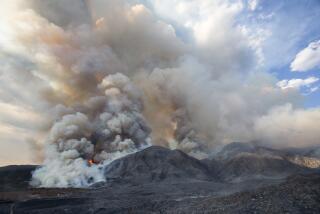U.S. Carbon Dioxide Emissions Jump in 2000
- Share via
WASHINGTON — Heat-trapping carbon dioxide emissions jumped 3.1% in the United States last year, the biggest one-year increase since the mid-1990s, the Energy Department reported Friday.
Carbon dioxide emissions in 2000 were nearly 14% higher than in 1990, the department’s Energy Information Administration said. The global-warming pact that President Bush rejected this year commits industrialized countries to roll back “greenhouse” gas emissions to 1990 levels.
The unusually large increase in U.S. carbon dioxide emissions was the result of strong economic growth in 2000, more use of fossil fuels due to colder weather and a drought that impeded hydroelectric power generation, the agency said.
The report was an upward revision of a 2.7% preliminary estimate released in June. Its release coincided with the last day of international climate treaty talks in Morocco aimed at reaching a deal to curtail global warming.
Senate Environment Chairman James M. Jeffords (I-Vt.) said Friday that the United States, as the largest contributor to global warming, must take responsibility for its share of the problem.
The United States remained on the sidelines at those talks Friday as negotiators tried to overcome a deadlock over rules for cutting greenhouse gases.
The controversy hinged on whether countries falling behind on mandatory cuts can use “flexible mechanisms,” such as pollution credits, to pay for other nations that more than meet their targets.
Environmental Protection Agency Administrator Christie Whitman said the United States has offset its greenhouse gas emissions in other ways.
“Just because you’re not mandating everything from the top doesn’t mean you’re not making a difference,” she said in an interview with Associated Press this week. “We’re not going to obstruct any actions that any other country wants to take.”
As for the Bush administration’s own proposals, Whitman said climate change plans “got knocked off track by Sept. 11, but the president’s very interested in it and he asked at the last Cabinet meeting where we are. The staff has been working on it right along.”
Among the greenhouse gases, whose growing concentration in the atmosphere is believed to be warming the Earth, carbon dioxide from burning fossil fuels is the most prevalent. Many scientists believe the warming, if not stopped, will cause severe climate changes over the next century.
The United States and other industrialized countries agreed in 1992, at the Earth Summit in Rio de Janeiro, to pursue voluntary actions to try to bring greenhouse gas emissions back to 1990 levels by 2000.
But after realizing that goal would not be achieved, the same countries agreed in 1997 in Kyoto, Japan, to mandatory commitments to reduce emissions by 2012. The United States later withdrew from the Kyoto Protocol.
Bush has said voluntary actions and technology should be relied on to curb emissions in a way that won’t harm the U.S. economy.
The latest carbon emission numbers “underscore the urgent need for the United States to begin cutting its emissions,” said Eileen Claussen, a former State Department climate treaty negotiator and now head of the private Pew Center on Global Climate Change.
According to the Energy Department, the United States released 1,583 million metric tons of carbon from fossil fuel burning in 2000, or 47 million metric tons more than in 1999. The 3.1% growth rate was the biggest since a 3.6% increase in 1996.
More to Read
Sign up for Essential California
The most important California stories and recommendations in your inbox every morning.
You may occasionally receive promotional content from the Los Angeles Times.













